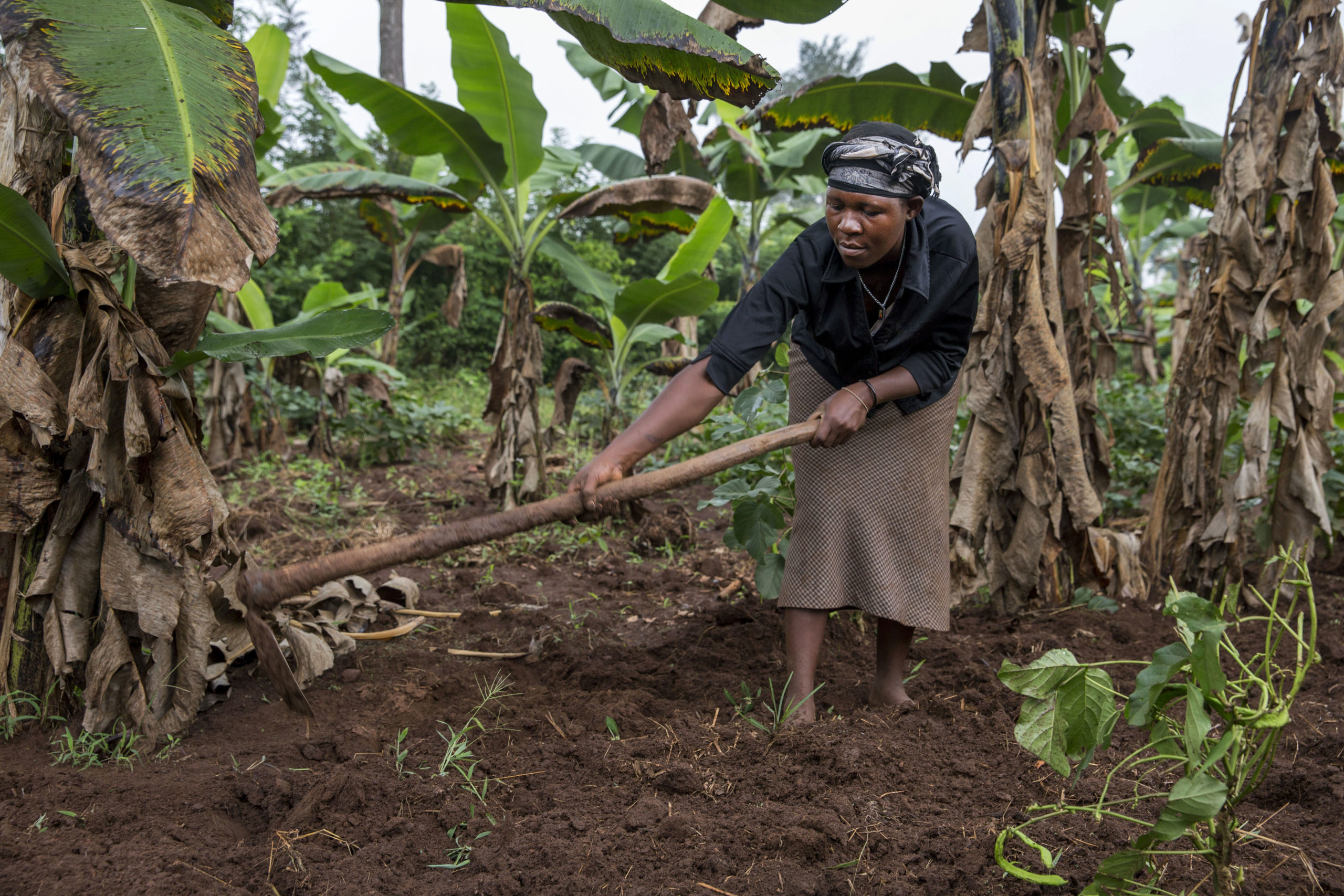
Where are the women in International Banana Trade
In a world catering to every pleasure and individualistic desire, the banana seems to be the one thing rocking everybody’s socks off. Why else is this common denominator available at roughly the same price in your local supermarket winter to summer, 365 days a year? Is someone getting ripped off to maintain this price? In this blog, we will consider how the low price of bananas works, where women are in the global trade of bananas, and sketch out illicit financial flows within the process.
The global economy and international relations is often considered in gender-neutral language, unless you’re pursuing a specifically gendered issue like the gender pay gap. Yet as captured by Cynthia Enloe, renowned feminist and scholar of international relations, in her delightfully snarky read ‘Bananas, Beaches and Bases: Making Feminist Sense of International Politics‘, gender relations are in fact entrenched in everything created by human beings, even in the international trade of bananas.
In her book (2014) Enloe, asks the question of where women are in the international politics of bananas. She calls on each one of us to ‘exercise genuine curiosity’ about each woman in this international system, whether she is the domestic worker in the CEO’s home, packing crates in a banana warehouse or the grocery-shopping housewife. Feminists are to think about those actors within the global economy system, extending your imagination to ‘those women you have yet to think about.’
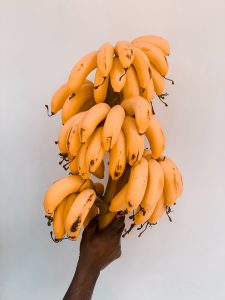
The Cavandish is the cherished yellow banana that Europeans, the Japanese, the Arabs and everyone else consumes daily. Weight trainers choose it for the protein, dieting mothers as a meal replacement, sex-ed for its physical attributes while broke-ass students snack it on the run. Beyond individual consumption, the Cavendish is a highly industrialized product, designed for global trade and maximal profit.
A Snapshot of Gender Relations in the International Banana Trade
Enloe sparks a thought experiment to imagine the global value chain in bananas and the women within it. Think about it this way, the alliances between men brought about the banana plantations. Businessmen and male officials of the importing countries made arrangements with male landowners and government officials of the exporting countries.
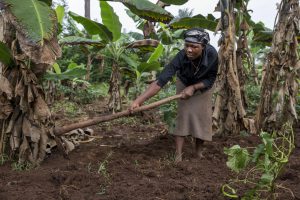
A member of the Kaku women’s group, working in Banana plantation that is used as an inchme generating activity for the group. The women use the income to support their families and pay the school fees for their children.
Often crops requiring machetes like the banana are produced from male labour but as proven by Ghanaian and Ugandan women, gender is not a necessary consideration in the distribution of labour on plantations. Best not to forget that women in Uganda and Ghanaian women in the banana industry are pretty tough too! Going further along the global value chain, company executives, still usually men, invested a great share of capital into sophisticated equipment and technology for the transportation of this fragile tropical fruit to markets abroad. The companies would then target women looking for a reliable product for their families’ nutrition. The success of international business practise today, sees that affluent countries import bananas from mainly poor, largely agrarian countries. Since the majority of us get our bananas from large agribusiness corporations, chatting to Senegalese market women will also highlight to you how much they wish they could sell their bananas in the international markets too.
Going Bananas with International Trade
Illicit financial flows (IFFs) is the practice where money is moved illegally from one country to another. To explore the way in which IFFs are present in the global trade of bananas, there are several recognised practises used in all international business. For the sake of brevity, let’s just start off with the point that unlike everything else in this life, bananas have a weird ability to hold a certain price range.
As reported by Joseph Stromberg, the standardisation, cultivation and mass production of the Cavendish was done so successfully, it brought down the price of bananas for consumers and whipped up a huge dollop of entitlement to go with our banana splits. Would you believe, consumers so strongly protest against the increase of banana prices that supermarkets willingly make a loss to ensure consumers keep coming to the store? It blows my mind to think why we have not done something like this with sanitary products. It’s an odd kind of logic to think cheap bananas will bring mothers, the main target, into a shop and not cheap tampons…. Anyway, the other thing that banana prices also don’t account for is the environmental degradation caused by long-term and large-scale cultivation of the land in agrarian economies. And there’s more to this story on price when looking at the global trade of bananas.
According to the research on Central American bananas by Hong and Pak (2014), alone in November 2009, the United States imported 9,847 tons of bananas from Costa Rica for $2.3 Million (CIF), thus paying $0.24 per kilogram. However, the free market importer’s price recorded by the UNCTAD for the same month was $0.83 per kg. This difference in pricing meant that the US importer’s undervalued amount stood at $6 million, indeed a wealth inflow to the United States. The banana import record shows a significant undervaluation, in a situation academics gently call a ‘high probability of mispricing’. Looking deeper at the issue, a 2015 report underscores how bureaucracy in customs has not adapted monitoring techniques adequately to keep track of the overwhelming trade relations of recent decades. In current practises custom officials expected to investigate at random or wait for informants to tip them off on abnormal pricing, driving all of us bananas with such inefficiency. One way to deal with this would be for officials to more efficiently monitor discrepancies with UNCTAD reports.

In a startling Ted Talk, Yale’s Senior Global Justice Fellow James Henry presents his research on how multinational corporations transfer capital offshore in a race to the bottom of corporate tax. He details how the banana cartel, sets up subsidiary companies in the Caymen Islands, Ireland, Luxembourg and the Isle of Man.
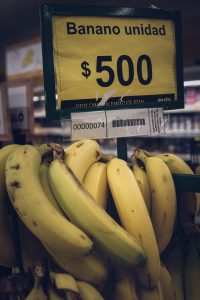 The export price for half a kilogram of bananas in Ecuador would be USD 0.16 cents, where labour costs are USD 0.12 cents, production costs USD 0.13 cents and taxable profits USD 0.12 cents. Drawing alone on the activities in these three tax havens, they respectively provide banana corporations a purchasing network (USD 1.20 cents ), branding (USD 0.5 cents), financial services (USD 1.2) and insurance (USD 0.5 cents). By paying an income to these bogus intermediate services, at a price determined by the corporations themselves, in essence charging themselves for these activities, the practise remains unchecked by auditors and the cartels get away without paying a significant amount of taxes. Thus, thanks to armlength transfer in financial flows the import price of bananas to the United Kingdom is USD 0.76 cents, a much higher import price than the actual export price.
The export price for half a kilogram of bananas in Ecuador would be USD 0.16 cents, where labour costs are USD 0.12 cents, production costs USD 0.13 cents and taxable profits USD 0.12 cents. Drawing alone on the activities in these three tax havens, they respectively provide banana corporations a purchasing network (USD 1.20 cents ), branding (USD 0.5 cents), financial services (USD 1.2) and insurance (USD 0.5 cents). By paying an income to these bogus intermediate services, at a price determined by the corporations themselves, in essence charging themselves for these activities, the practise remains unchecked by auditors and the cartels get away without paying a significant amount of taxes. Thus, thanks to armlength transfer in financial flows the import price of bananas to the United Kingdom is USD 0.76 cents, a much higher import price than the actual export price.Resources countering the Gendered Impact of Illicit Financial Flows
In the evergreen words of Cynthia Enloe, ‘the international is personal’ because it is impossible to separate the individual realm from the complexities of the global system. In a nutshell, the banana trade dynamics are problematic because on one hand labourers in countries like Ecuador are paid peanuts on banana plantations and low export prices means lower revenue from taxation to the state. In turn, the weak economy pressurises women to be more engaged in the care economy, while at the same time in the case of Ecuador a regional refugee crisis stemming from Venezuela is overstraining precious resources. After all, the less tax that countries reintegrate from corporations into their social welfare system means the greater the burden of women who use their personal resources to fill systemic gaps in health, education and infrastructure. If you’re curious to see what the value of your care labour is, check out Oxfam’s Global Care Calculator. The reality is that if IFFs remain unchecked, the value you are reading is bound to increase.
Of course the picture is quite different for the banana corporations, where practises of illicit financial flows safeguard sizable profits for the business elite, their profitability ensuring the status quo of international business. Do not dismay though, illicit financial flows are receiving unprecedented attention in the international realm. Attention from you and the general public outcry on the growing global inequality, for instance through Agenda 2030, for Sustainable Development, is the best way to keep this momentum going, over and above the serious challenge of reforming international trade. If you’d like to learn more about how formidable non-governmental organisations are going about this nexus in IFFs and gender the Association for Women’s Rights in Development offers fantastic analysis on the gendered effects of IFFs and what gender-sensitive IFF policies could entail.
In this women’s month, it is our duty to honour all feminists, past and present, by engaging in the new frontiers of feminist debate and international trade. Shout out to the Tax Justice Network Africa for keeping at this uphill battle to #StoptheBleeding.
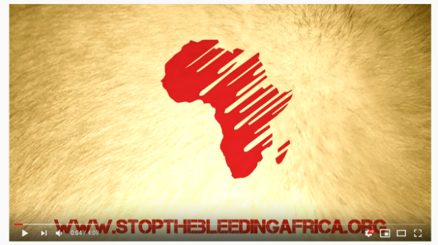
Contacts: Tamara Naidoo, Email: naitam08@gmail.com
Author: Ms Tamara Naidoo holds a Masters in Philosophy in Multidisciplinary Human Rights from the University of Pretoria (2016) and through a European Union scholarship is currently pursuing her second Masters Degree in Global Studies via the Universities of Wroclaw (Poland), Maquarie (Australia) and Leipzig (Germany). She previously volunteered as Deputy Secretary-General at the United Nations Association of South Africa. While initially specializing in peace and security in her role as Research and Development Officer at the Southern African Liaison Office, she later became Programme Manager for International Relations at the Friedrich Ebert Shifting in South Africa to further explore international political economy issues through the lens of progressive thinkers in South Africa and the world
‘’The views and opinions expressed in this blog are those of the author and do not necessarily reflect the official policy or position of Tax Justice Network Africa. Assumption made in the analysis are not reflective of the position of any other entity than the author’’
